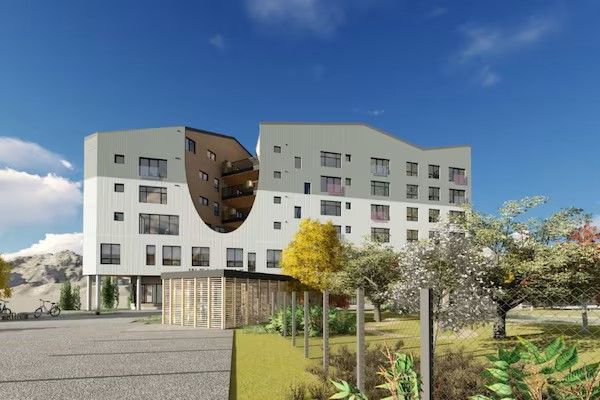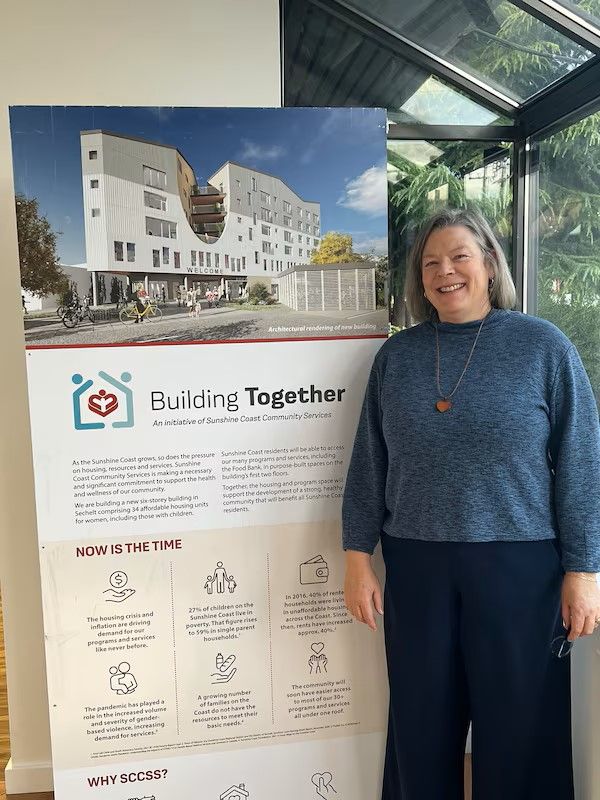Struggles with housing shortages affecting B.C.’s small towns
We're excited to share that The Globe and Mail recently featured our Building Together project! This $34-million development in Sechelt will provide 35 affordable housing units for single women and women with children, helping to address the growing housing crisis on the Sunshine Coast.

Studio 531 Architects
Catherine Leach thought she would be pushed out of British Columbia’s Sunshine Coast when her landlord decided to sell her home.
“I got super lucky that one of the few apartment buildings opened up and I got a suite in that building,” she says. “I would have had to leave the Coast. It was that close. And it’s not just about people having a home to live in. It’s about an affordable home and having homes so that people can actually work here.”
Ms. Leach is executive director of the Sunshine Coast Community Services Society, a large 50-year-old multiservices nonprofit that serves a scattered population of 32,000 people along 100 kilometres of coastline. The Sunshine Coast is about a half-hour ferry ride from Horseshoe Bay in West Vancouver, and it’s long been an idyllic draw for residents of Metro Vancouver who want a quieter, less expensive seaside lifestyle.
But a shortage of affordable housing has led to a growing crisis in the small community, and it’s taken shape with a tent city in downtown Sechelt that sprung up in recent years.
“It’s impacting everybody in every way – that’s how bad it’s become,” she says of B.C.’s housing crisis.
Nonprofit workers on the front line know that people aren’t just sleeping in tents or in shelters and living in the rough. There are hidden homeless people living in their cars, in wooded areas, sleeping in boats and on couches, in motel rooms, and even in short-term rentals, because they’ve been squeezed out of the housing market. Low-income groups such as seniors are particularly impacted. Marc White, chair of the Older Persons and Elders Advisory Committee, which advises Vancouver city staff and council, has heard reports of seniors sleeping in the Vancouver airport because it’s safer.
“I think it’s all over [the province],” says Dr. White, who is Clinical Assistant Professor with the Department of Family Practice at the University of British Columbia. “Because when you look at 43 per cent of the people on the BC Housing wait list, they are 55 and older, and half of those are experiencing homelessness for the first time as a senior – and that is incredible.”
He cites a recent Statistics Canada report that shows B.C.’s hidden homelessness rate was at 17.7 per cent in 2021. People had been asked if they’d ever had to live somewhere temporarily because they had nowhere else to go. Considering the rents B.C. seniors are paying, it’s no wonder.
“Right now, based on census data, there are 14,000 [Vancouver] seniors paying more than 30 per cent of their household income on rent in the private market, and 5,100 households spending 50 per cent of their household income on rent,” he says.
The Sechelt encampment is located near the Sunshine Coast’s only year-round homeless shelter and a transitional housing project with health and social services. There aren’t enough beds or services, so the community is pulling together.
The Sunshine Coast Community Services Society is soon breaking ground on a striking new housing project by lead architect Jesse Garlick of Studio 531 Architecture. Part of the inspiration behind the U-shaped design, says Ms. Leach, was to create an inward sense of safety. The building will include 35 units of housing for single women and women with children, in response to the statistic that 59 per cent of the Coast’s children are living with a single parent who is living below the poverty line.

Ms. Leach says the project, in partnership with BC Housing, is six years in the making. As executive director of Kitsilano Neighbourhood House, she was also involved in that redevelopment, and she learned that support for vulnerable people starts in their own communities.
“If there was any wish for me – and the government knows this, everybody knows this: fund projects that are more complex that are actually going to affect change. Like, don’t continue to just put very targeted, particularly very vulnerable people all jammed together in one location and walk away. Don’t do that anymore.”
Their crisis is an extension of the Vancouver crisis, but they don’t have the same resources to address it, says Kelly Foley, Sunshine Coast regional housing co-ordinator for Cover the Coast, a local affordable housing society. She co-authored a 2023 assessment needs report that shows crime, particularly violent crime, increased between 2016 and 2021, with a major spike in violent crime in 2020.
“Because we are such a bedroom community to Vancouver, the cost of housing in Vancouver has certainly had an impact here,” says Ms. Foley. “You combine that with older adults moving here and we are in a tough situation, because we have a lack of working-age adults that can’t afford to live in our community, and who could help support those people.”
Half the population of the Coast is older than 55, and about one-third are over 65, she says. As well, the average household income is lower than the B.C. average.
People are fearful of the sudden changes they are seeing, particularly in downtown Sechelt, says Ms. Foley, who has met with residents of the encampment.
“What I’m hearing is that there are people who are living in tents, who are very vulnerable, and also there’s a criminal element that is more predatory, I would say. It’s grown significantly, the amount of property crime and the frustration in the community around that,” she says.
“I think people that are living and working in downtown Sechelt, there are challenges, there is fear. There is concern. Some people aren’t feeling safe. Again, it’s not just because of the tent city. That’s a visual emblem … it’s the overall crime rate in that area that’s increased.”
Ms. Foley is working on a multipronged approach to help homeless people, seniors and workers who need housing. Her group is focusing on the lack of resources for people who want to recover from addiction, she says. They are also following the lead of the NORC Innovation Centre in Toronto, which identifies buildings that have a high percentage of seniors. NORC stands for “naturally occurring retirement communities,” and the goal is to connect seniors who are living in isolation and could use some support, so they can age in place.
And because 80 per cent of the housing stock on the Sunshine Coast is detached houses, they are also working with Small Housing BC to create sustainable co-ownership models for work force housing.
As Ms. Leach puts it: “This crisis is a long time in the making, and it’s going to be a long time in the fixing.”
See article: Struggles with housing shortages affecting B.C.’s small towns

 Give Today
Give Today  Get Involved
Get Involved  Stay Connected
Stay Connected